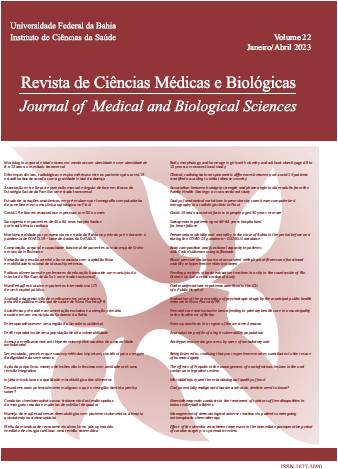Covid-19 and associated factors in people aged 50 years or more
DOI:
https://doi.org/10.9771/cmbio.v22i1.52476Keywords:
COVID-19; aging; elderlyAbstract
Introduction: the COVID-19 pandemic presented itself as an intense health crisis worldwide. The main risk factors considered were advanced age, being male, presence of chronic diseases, obesity, racial/ethnic factor as well as worse socioeconomic conditions. Objective: the aim was to investigate the association between COVID-19 and age group, gender, race/color, health conditions, and symptoms. Methodology: the cross-sectional study used data from medical records and mandatory reporting forms for individuals with COVID-19 seen at the Health Unit. For data analysis, the STATA® statistical package from StataCorp LLC, version 14.2, was used. Bivariate analysis, according to the presence of COVID-19, was performed using Pearson's chi-square test or Fisher's exact test. The multiple analysis adopted was the unconditional logistic regression modeling. Results: the sample included 239 individuals, and 38% had a positive diagnosis for COVID-19. Taste and smell changes were the most frequent symptoms among individuals with a positive result for COVID-19 when compared to those without the disease. The logistic regression model adjusted for presenting symptoms and race/color showed a statistically significant association between being elderly and having a positive diagnosis for COVID-19 (OR: 2.23; 95% CI: 1.01-4.98). Conclusion: taste changes and age group were the characteristics associated with COVID-19. The study validates the need to improve the quality of records generated in Primary Health Care, reinforcing the need for spaces with health professionals to develop a health information policy that strengthens the Unified Health System.
Downloads
Downloads
Published
How to Cite
Issue
Section
License
Copyright (c) 2023 Journal of Medical and Biological Sciences

This work is licensed under a Creative Commons Attribution 4.0 International License.
The Journal of Medical and Biological Sciences reserves all copyrights of published works, including translations, allowing, however, their subsequent reproduction as transcription, with proper citation of source, through the Creative Commons license. The periodical has free and free access.


